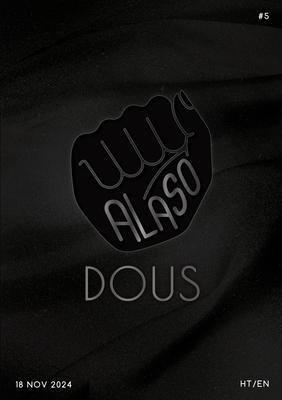This fifth issue of Alaso comes to life at a time when chaos and terror have reached a new threshold in Port-au-Prince: that of paralysis. The capital, almost completely cut off from the rest of the country by the main national roads, is also cut off by air at the time of publication of this issue (March 2024). Those who could manage to no longer can, not even by plane. The options are: risk the road, traverse the mountains of Jacmel, or find someone who knows someone who can buy an overpriced ticket for a helicopter to Cap-Hatien, Jacmel, or the Dominican Republic. But this is only part of the journey because first, you must actually have the means. Or you have to know someone who knows someone who can pay for accommodations in sparsely resourced cities, where prices are unaffordable, and wait for a seat to become available on an even more expensive flight to Miami. At this point, there is no need to know someone who knows someone; the game is more perilous. Now, one must possess the Holy Grail: a visa for the United States or an approval from Biden.
It would have been easy to opt for a theme that resonates with current events, but that would be to misunderstand the momentary aspect of the situation. The implicit, daily terror, previously limited to certain spaces, has now spread everywhere. And if we do not appreciate the depth of the complex layers of violence, resentment, and injustice spanning decades, it will be easy to flounder-as seen in the colonialist nostalgia on social media marked by the revisionism of the "pearl of the Antilles." We then risk entering a space where it is not social justice that counts but rather the desire to produce images for storytelling. This fifth issue, Dous [pleasure/desire], is not an escape from reality but the continuity created by the space that feminist thought represents: holding the line in the face of opposing forces. Alaso, not being a news magazine or a newspaper, does not have the imperative to respond to the events of the moment, but as a feminist anthology, it must be a space for a moment. Each issue tackles this to shed light on the present and the past but also to act as an archive and serve as a benchmark for the moment of its creation. Dous, pleasure/desire is addressed in this issue on personal, intimate, and political scales, or sometimes all three intertwined.
Contributions
Myriam J. A. Chancy
Micalle Charles
Dashka-Rheyna Charlemagne
Anase Hector
Nathalie Joachim
Tafa Mi-soleil
Mlissa Paultre
Andrise Pierre
Thara Layna Marucheka Saint Hilaire
Setzelpeyi (STZL)
Ruth Dharwina Valmyr
Translation
Galle Bien-Aim
Nathalie Cerin
Anne-Doris Lapommeray
Nadine Mondestin
Illustrations
Corine Bond
Publication director
Fania Nol
Editorial assistant
Dashka-Rheyna Charlemagne
Anase Hector
